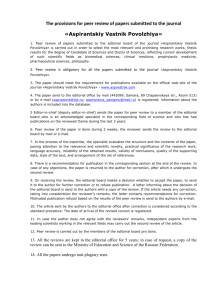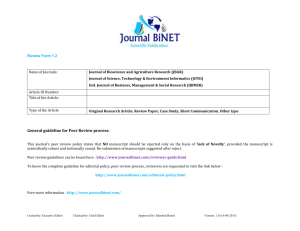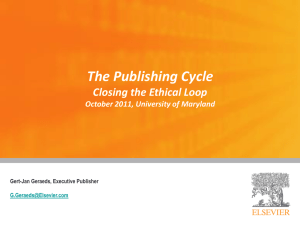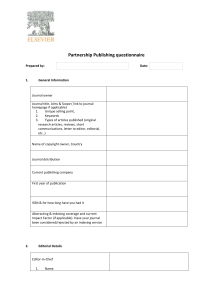Redakční rada časopisu Acta Oeconomica Pragensia
advertisement
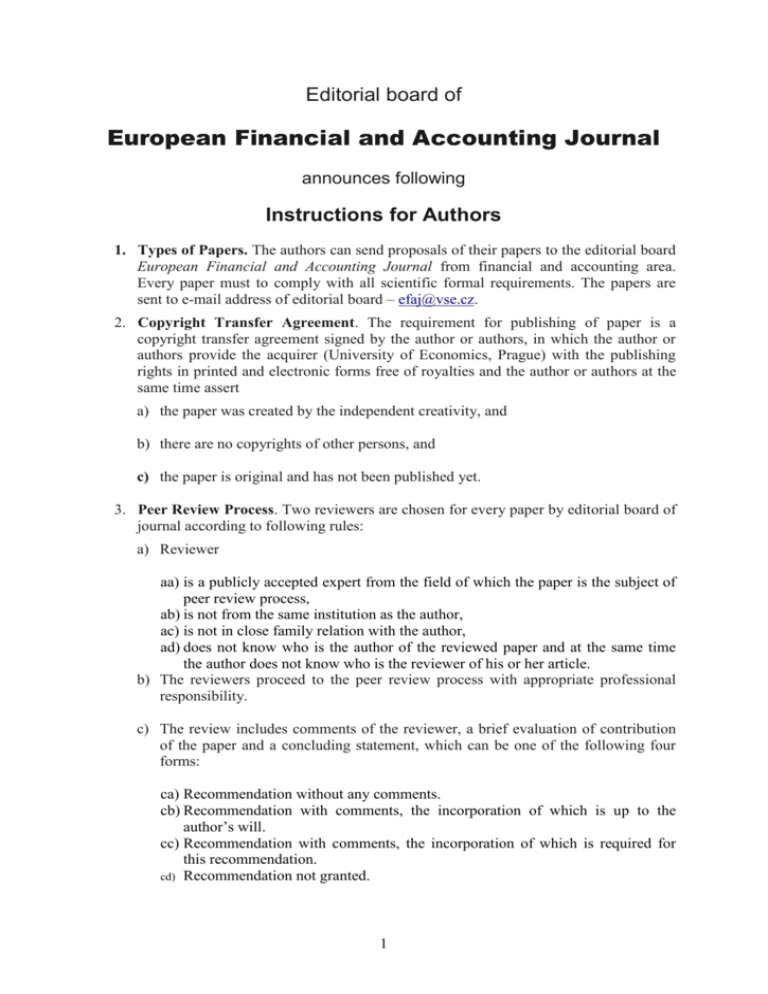
Editorial board of European Financial and Accounting Journal announces following Instructions for Authors 1. Types of Papers. The authors can send proposals of their papers to the editorial board European Financial and Accounting Journal from financial and accounting area. Every paper must to comply with all scientific formal requirements. The papers are sent to e-mail address of editorial board – efaj@vse.cz. 2. Copyright Transfer Agreement. The requirement for publishing of paper is a copyright transfer agreement signed by the author or authors, in which the author or authors provide the acquirer (University of Economics, Prague) with the publishing rights in printed and electronic forms free of royalties and the author or authors at the same time assert a) the paper was created by the independent creativity, and b) there are no copyrights of other persons, and c) the paper is original and has not been published yet. 3. Peer Review Process. Two reviewers are chosen for every paper by editorial board of journal according to following rules: a) Reviewer aa) is a publicly accepted expert from the field of which the paper is the subject of peer review process, ab) is not from the same institution as the author, ac) is not in close family relation with the author, ad) does not know who is the author of the reviewed paper and at the same time the author does not know who is the reviewer of his or her article. b) The reviewers proceed to the peer review process with appropriate professional responsibility. c) The review includes comments of the reviewer, a brief evaluation of contribution of the paper and a concluding statement, which can be one of the following four forms: ca) Recommendation without any comments. cb) Recommendation with comments, the incorporation of which is up to the author’s will. cc) Recommendation with comments, the incorporation of which is required for this recommendation. cd) Recommendation not granted. 1 In the case of statement cc) the paper is sent back to the reviewer for new peer review process. In the case of statement cd) the paper cannot be published. d) The editorial board, in the case of dubiousness about the conclusions of review, can decide for another reviewers for the comparison. In this case it is necessary at least two positive reviews for the paper publication (see statements ca), cb)). e) The list of reviewers will be published in electronic form of the journal, but without any reference to papers. 4. Paper selection is made by the editorial board on the basis of the peer review process. There is no legal claim for the publishing of the paper. No printed fees are required. 5. Form of papers. Every paper must meet the following formal requirements: a) Papers are sent in electronic form and must be created in one file of MS Word format (up to XP version). b) Papers must be created according to the Sample paper. c) Papers, which are under peer review process, should not exceed 25 pages of the sample paper format. d) Papers must be processed according to the rules of English grammar. e) Papers must be processed in the way, so they could be published in black and white form. For example the text color must black, no color table background, color pictures and graphs with color background, color links, color borders or color legend are not allowed. f) Papers must include the name, surname and academic degrees of the author, his or her contact e-mail address and the name and address of the institution. g) Papers must include Conclusions, References, Abstract (a brief description of the paper), Key words (at least 3 key words which characterize the topics of the paper) and Journal of Economic Literature Classification <http://www.aeaweb.org/jel/guide/jel.php> h) Equations. The equations must be numbered and must be created in Microsoft Equation 3.0 format. i) Variables. Variables must be written using italics format. j) Numbers. When writing a number, the comma is used for decimal point, while thousands are separated by the fixed blank. k) Tables. Every table must be numbered, must contain a title and in the case of data adopting, it must contain a data source. l) Figures (graphs, schemes). Every figure must be numbered, must contain a title and in the case of data adopting, it must contain a data source. 2 m) Footnotes, should be used only exceptionally and they only act as presentation of the author by specification of the name, surname, academic degrees, e-mail address and the name and address of institution, description of the research projects, the result of which is the presented paper, further notes explaining the text, but not as references. 3 6. References must be according ČSN ISO 690:1987 and ČSN ISO 690-2 norms. Extract from international ISO norms dealing with bibliography are available at: <http://www.collectionscanada.ca/iso/tc46sc9/standard/690-1e.htm>, or <http://www.collectionscanada.ca/iso/tc46sc9/standard/690-2e.htm>. a) References in the text are processed according to the article 9.4 of the ISO 690 norm (The first element and year of publication of the document cited are given in the text. If the first element occurs naturally in the text, the year follows in parentheses, but if not, both the first element and year are given in parentheses. If necessary, page numbers may be given after the year within parentheses. If two or more documents have the same first element and year, then they are distinguished by lower case letters (a, b, c, etc.), following the year within the parentheses). Example: Thesis of dividend irrelevancy was firstly appeared in 60’s of last century (Miller – Modigliani, 1961). Later the thesis was empirically tested by e.g. Black and Scholes (1974a). According to Lease (2000, p. 46) ... b) References can contain only those citations, which refers to the text. c) Citations in References are used according the following form: ca) Book: Damodaran, A. (2001): The Dark Side of Valuation. Englewood Cliffs, Prentice Hall, 2001. cb) Contribution to the proceedings: Campbell, K. – Jerzemowska, M. (2002): A Comparison of Corporate Rating Systems. In. Zarzecki, D.: Zarzadzanie Finansami. Tom II. Szczecin, Uniwersytet Szczecinski, 2002, p. 717 – 730. cc) Contribution to the journal: Jensen, M. C. – Meckling, W. H. (1976): Theory of the Firm: Managerial Behavior, Agency Costs and Ownership Structure. Journal of Financial Economics, October 1976, vol. 3, no. 4, p. 305 – 360. cd) Internet article: Library and Archives of Canada: Excerpts from International Standards ISO 690:1987. [on-line], Ottawa, Library and Archives of Canada, c2004, last revision 15th August 2003, [cited 9th March 2005], <http://www.collectionscanada.ca/iso/tc46sc9/standard/690-1e.htm>. 4
